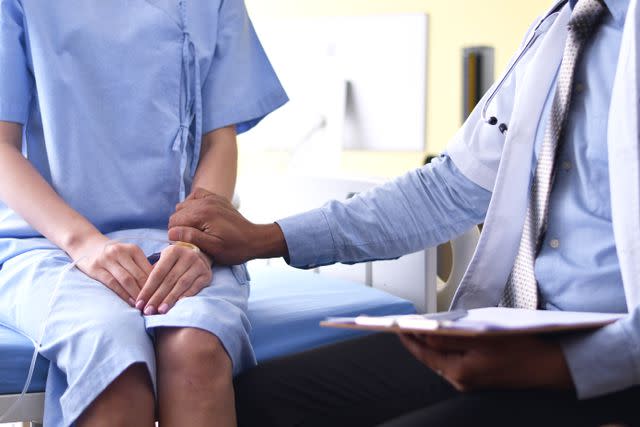What the Chemotherapy Drug Shortage Means for Patient Care

Getty Images / wera Rodsawang
Fact checked by Nick Blackmer
A majority of top cancer centers in the United States are experiencing a shortage of the chemotherapy drugs carboplatin and cisplatin.
Shortages like this can lead to delays in treatment, worse patient outcomes, and force patients to switch to different treatment options.
Experts recommend patients look into free resources that help them understand their care plan, as well as stay in close contact with healthcare providers who can keep them up-to-date on their options.
More than 90% of the nation’s top cancer centers have been affected by a shortage of chemotherapy drugs.
A recent survey by the National Comprehensive Cancer Network (NCCN) found that the majority (93%) of cancer centers across the U.S. have reported a shortage of the chemotherapy medication carboplatin, while 70% have experienced a shortage of cisplatin.
Both carboplatin and cisplatin are used to treat many different types of cancer.
These drugs are vital to effective cancer treatment, especially since cisplatin is one of the most powerful chemotherapeutic drugs used for the treatment of cancers like ovarian cancer and testicular cancer.
Not having access to these drugs—or not having enough to treat all the patients who need them—can come at a cost.
“These drug shortages can lead to delays in treatment, worse patient outcomes, and force patients to switch to suboptimal treatments,” Julie R. Gralow, MD, FACP, FASCO, the chief medical officer for the American Society of Clinical Oncology (ASCO) told Health.
“Even when there are available alternatives, switching from a planned course of treatment adds even more fear and stress to that already caused by a cancer diagnosis,” she said.
Carboplatin and cisplatin are generic medications that were FDA-approved many years ago to treat ovarian, bladder, and testicular cancers. They are safe and effective, in addition to being affordable, Dr. Gralow said.
These medications are also commonly used to treat cervical, endometrial, lung, head and neck, esophageal, gastric, breast, and other cancers.
“The number of patients potentially impacted by the current shortages could be as high as 500,000 per year,” she said.

Getty Images / wera Rodsawang
Why There’s a Shortage Now
When it comes to generic medications, drug shortages have been an ongoing issue with the supply chain, said Robert W. Carlson, MD, chief executive officer for NCCN. In fact, shortages of generic medications are not limited to cisplatin and carboplatin.
But cancer drugs are among the hardest hit. There are an alarming number of cancer drugs on the Food and Drug Administration’s list of drugs experiencing a shortage.
While drug shortages are not a new problem, the last decade has been significantly worse, said Jeffrey Pilz, PharmD, MPA, MS, BCPS, assistant director of pharmacy and medication safety and drug policy for The Ohio State University Comprehensive Cancer Center—Arthur G. James Cancer Hospital and Richard J. Solove Research Institute.
These drug shortages can occur for many reasons. For instance, there could be manufacturing and quality problems, delays, and discontinuation.
“In this situation, one manufacturer had to stop production due to safety and quality concerns, and there simply wasn’t enough capacity to ramp up production at other plants,” Pilz said.
According to Pilz, even the fact that carboplatin and cisplatin are sterile injections could be contributing to the issue because of the number of steps that are involved in manufacturing these drugs.
That said, Dr. Carlson is hopeful things will be back to near normal by the fall, if not sooner. But he cautioned that the shortages could get worse before they get better. “We must find ways to eliminate the problem of drug shortages before the care of more people with cancer is negatively impacted.”
How Drug Shortages Have Impacted Treatment
According to Pilz, cancer centers are working hard to make sure that patient outcomes are not impacted.
“Shortages like these, take extra hard work and creativity on the part of healthcare providers [to develop appropriate and effective treatment plans],” he said.
One way oncologists and healthcare providers are navigating the shortage is by using different dosing schedules or using alternative medications, Yoram Unguru, MD, MS, MA, HEC-C, an oncologist in the Division of Pediatric Hematology/Oncology at the Herman & Walter Samuelson Children’s Hospital told Health.
“Rationing, prioritization, and allocation are happening daily throughout the country as hospitals and clinicians struggle to provide care to patients,” said Dr. Unguru, who serves as the chairman of the Sinai Hospital Ethics Committee.
This results in extreme moral distress for both clinicians and patients who understand how patient care would progress with the proper medications.
“Some of the most difficult discussions I have had with patients and parents have centered around otherwise avoidable drug shortages,” Dr. Unguru said.
Related: Personalized mRNA Vaccines Could Significantly Reduce Risk of Melanoma Relapse
The Consequences of Chemotherapy Drug Shortages
The inability to administer cisplatin and carboplatin has wide-ranging implications for patients, with the potential for inferior outcomes, including lower survival, and greater risk for disease recurrence, Dr. Unguru said.
Meanwhile, the longer-term consequences of the shortages remain to be seen. “Some patients may experience a relapse of their disease that could have been avoided were they to receive chemotherapy as originally intended,” Dr. Unguru said.
Another potential issue is that small cell lung cancer, as well as some gynecologic cancers, are very platinum-sensitive, meaning these drugs have a dramatic curative effect on the cancer, said Sanjay Juneja, MD, a triple board-certified hematologist and medical oncologist with Mary Bird Cancer Center, Baton Rouge, Louisiana.
Dr. Juneja explained that other treatment options do not have the same effect on these types of cancer.
Alternatives do not necessarily eliminate the chance of a patient becoming cancer-free, but depending on when they are given, the risk of recurrence with an alternative is likely higher.
“As if having a cancer diagnosis is not hard enough on a patient as well as their loved ones, having this lingering question of ‘what if,’ even if the outcome would have been the same, is particularly tragic,” Dr. Juneja said.
Related: People With Asthma May Have a Higher Risk of Cancer—And Not Just Lung Cancer
Supply and Demand of Chemotherapy Medication
There is one spot of brightness in all of this, though. According to Dr. Gralow, the FDA announced it would begin importing cisplatin, and domestic manufacturers have increased production, which is welcome news, Dr. Gralow said.
But oncologists are still concerned about meeting demand, even with this announcement. In fact, Dr. Unguru said it’s hard to see how the nation’s supply will catch up to the demand anytime soon.
“What is sad is, the person who is the closest point of contact for a patient to overcome this nebulous disease, does not have the slightest knowledge on the inner workings of drug development and delivery,” said Dr. Juneja.
“It makes it particularly hard when being asked this question by understandably desperate family members and patients,” he said. “It makes an already emotionally difficult thing, even more difficult.”
What Can Be Done to Remedy the Situation
The goal of organizations like the NCCN and ASCO is to not only resolve this problem but make sure it doesn’t happen again in the future.
“We are calling on the federal government to use their influence to spur safe manufacturing of these highly effective generic drugs and to consider strategic stockpiling of key generic drugs in the future,” Dr. Carlson said.
Repairing broken markets and supply chains is crucial, he said, especially since there is limited incentive to manufacture generic drugs. Meanwhile, public and private payers could improve treatment by working with healthcare providers to authorize guideline-concordant alternative therapies in an efficient and streamlined manner.
“[In the meantime], people with cancer can be assured that NCCN and other cancer providers are working for them day and night to eliminate this shortage,” Dr. Carlson said. He recommended patients visit the NCCN website for free resources to help them understand their care plans, including alternate options where applicable.
“Working together, we can find long-term solutions and prevent drug shortages like this in the future,” Dr. Carlson said. “People with cancer should know that their well-being and concerns are of the utmost importance, and they should bring any questions they have to their providers.”
Related: CDC Report: 9 Million Americans Not Taking Medications as Prescribed Due to Cost
For more Health news, make sure to sign up for our newsletter!
Read the original article on Health.

